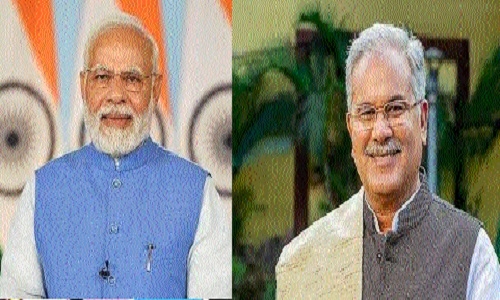CM for promotion of millet crop
| Date :09-Jan-2023 |

Staff Reporter
RAIPUR,
Chhattisgarh Chief Minister Bhupesh Baghel has on Sunday written a letter to Prime Minister Narendra Modi, requesting him to take an initiative to promote millet crop production and consumption and to make it a mass movement. In the letter, the Chief Minister said that 20 to 25 percent of subsidised food grains are distributed under the ‘National Food Security Act,’ mid-day meal programme, nutrition food provided by the Women and Child Development Department, and subsidised food grains are given to students of ashram-hostels.
Decision regarding the inclusion of crops, collection of millet crops at the minimum support price by the Central Government to the State Governments and supply of millet to the State Governments at a subsidised rate for use in schemes related to grain distribution and nutritional food called upon to make a decision.
The United Nations has declared 2023 to be the ‘International Millet Year’ on the initiative of the Government of India. Millet crops have the potential to help control anaemia and malnutrition. Unfortunately, due to a lack of a marketing system in recent years, the country’s millet crop production has decreased, said Baghel in the letter.
Meanwhile, Chief Minister Baghel has written in the letter that with the establishment of the ‘Millet Mission’ to promote the production of millet crops in State of Chhattisgarh, Kodo, Kutki produced in the state. Furthermore, by establishing a minimum support price for ragi, concrete plans for its collection and marketing have been established.
An input subsidy of Rs 9,000 per acre is also being given to these millet growers in State. In no State of the country, so much assistance is being given to the producers of millet crops. Due to these reasons, the area and production of millet crops have increased more than two times in State in the last two years.
The Chief Minister has written in the letter that in order to promote the production and consumption of millet crops and to make it a ‘people’s movement’, it would be appropriate to decide that food grains distributed under the ‘National Food Security Act’, mid-day meal programme, 20 to 25 percent of millet crops should be in the nutritious food being given by the Child Development Department and the subsidised food grains being given to the students of ashram-hostels. If the central government decides to collect millet crops at the minimum support price and supply them to state governments at a subsidised rate for use in the above schemes, there will be an unprecedented increase in millet crop production and consumption. The Chief Minister has requested the Prime Minister to issue instructions to the relevant departments to take the above decision as soon as possible.